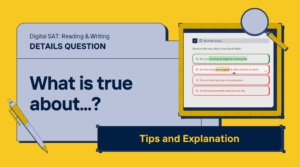The SAT is just around the corner, and with only a week left, the smartest move isn’t cramming—it’s sharpening the way you take the test. Small shifts in strategy can make the difference between feeling rushed and staying in control. Here are three practical tips to help you stay calm, focused, and ready to perform your best on test day.
Hide the Timer
But if you constantly check the timer every 30 seconds, it’s self-destructive: you’re distracting yourself from the questions, which require your 100% concentration. Constantly checking the timer only side tracks your main goal, not to mention it makes you unnecessarily nervous. You’ll be calculating how much time you’ve spent on the question and how much time is left. What’s even worse, you’re going to beat yourself up when you realized you “wasted time” on a question that you should have bookmarked for later.
So save yourself from this inner drama caused by this little ticking clock at the top.
Besides, if you’ve been doing full practice tests without running out of time, then time is not really your concern anyway. And if you HAVE been running out of time, then there’s no reason you should make it even more stressful for yourself by constantly staring at the timer. So hit that hide button the second you start a module. It’s surprisingly freeing.
But if you don’t have this confidence to trust your pace, then still hide the timer, but only check every 5 to 10 minutes. And NEVER check in the middle of a question. By the time you feel you’ve spent too much time on a question, what you should do is bookmark it and move on, not check the timer to make yourself feel bad.
TL;DR: Don’t let the timer highjack you. Hide it at the start, only check it every 5–10 minutes (never mid-question), and bookmark to manage tough questions.
Skip the Questions That Slow You Down
One way to set yourself up for failure is getting frustrated at the start of the test. So how do we avoid that?
It’s all about identifying and admitting your weaknesses. If you know certain question types are difficult for you, leave them behind and treat them as a bonus if you get them right. So the strategy is simple: skip the types of questions that you typically get stuck on.
The top three are usually Words in Context, Inferences, and Quantitative Evidence questions (it might not be the case for you).
Words in Context can be discouraging because you’ll often see unfamiliar vocabulary in the choices. So if your vocabulary isn’t strong, skipping these questions at the start can be a smart move.
For Inferences questions, sometimes it’s tricky to see where the passage going. They require comparing details and working through the reasoning in the passage to choose the best conclusion. And that takes a lot of discipline and clear-headedness. So skipping them definitely is a win if the thought of them sends shivers down your spine.
And needless to say, Quantitative Evidence questions can be especially challenging. They require not only reading the passage but also interpreting graphs and converting numbers into words—or vice versa.
So, to avoid getting frustrated—which leads to overly poorer performance—bookmark and skip when you feel you’re being dragged down by certain questions.
TL;DR: Don’t get stuck. Skip the question types that slow you down, bookmark them, and save them for later. This keeps your confidence and momentum strong.
Slow Down to Speed Up
The single most effective strategy one week before the SAT is to slow down and read to genuinely understand the passage. It’s counterintuitive, yes. You might think there’s not even enough time and you can’t afford to slow down. But the truth is, if you get the meaning and idea accurately, it’s going to eliminate the chance of you misunderstanding something in the passage. This is important because the wrong choices are waiting for that to happen—the examiners know exactly what mistakes you can make when you read the passage without understanding it accurately!
A key practice you can do is make sure you can absolutely nail Details and Main Idea questions. They are the cornerstones of your skills in understanding the meaning of the passages. If you already find them difficult, try these strategies:
- Slow down when you read these types of passages. Go as slow as sentence by sentence. Don’t assume you know what is being said or where the argument or narrative is going.
- Practice focusing on reading. Sometimes we read without really reading: it means our minds wander off and the attention drifts, and what our eyes take in is not processed by our brains. It happens a lot, but with awareness, you should be able to catch yourself while you’re not zeroing in on reading to understand.
- Picture what’s happening. When it’s a narrative, picture what the characters are doing, what the environment and objects look like, and what mood and atmosphere is being created. When it’s a scientific or social study passage, picture the topics and goals, and categorically label ideas with, say, bubbles or sticky notes with your imagination. Use this to see how topics and ideas relate to each other. In a word, try to reconstruct the meaning in your mind’s eye—that’s a sure way to read take in what you read.
If you can tackle Details and Main Idea passages with relative ease, then you have a very strong starting point for other advanced questions, such as Command of Evidence and Inferences questions.
TL;DR: Slow down to truly understand what you read. Accurate comprehension saves time by preventing careless mistakes.
Conclusion
With just one week left, your focus shouldn’t be on cramming every possible skill but on sharpening the strategies that give you the highest return. It should be the adopting and familiarizing yourself with these strategies: Hide the timer to protect your focus, skip the questions that drain your energy, and slow down enough to truly understand what you’re reading. These habits will keep you calm, confident, and efficient on test day. Remember, the SAT is not about perfection—it’s about playing to your strengths and maximizing every point you can earn.
Did you know we have FREE SAT English questions and weakness analysis?
In fact, this very question is from our Free SAT Reading & Writing Quiz. Analyze your skills in Reading & Writing, and discover your study focus. Complete the free questions and receive a full report of your strengths and weaknesses.
#satengtips #digitalsat #sat #dsat #satprep #sattips #sathacks #satstrategies #satenglish #satreading


